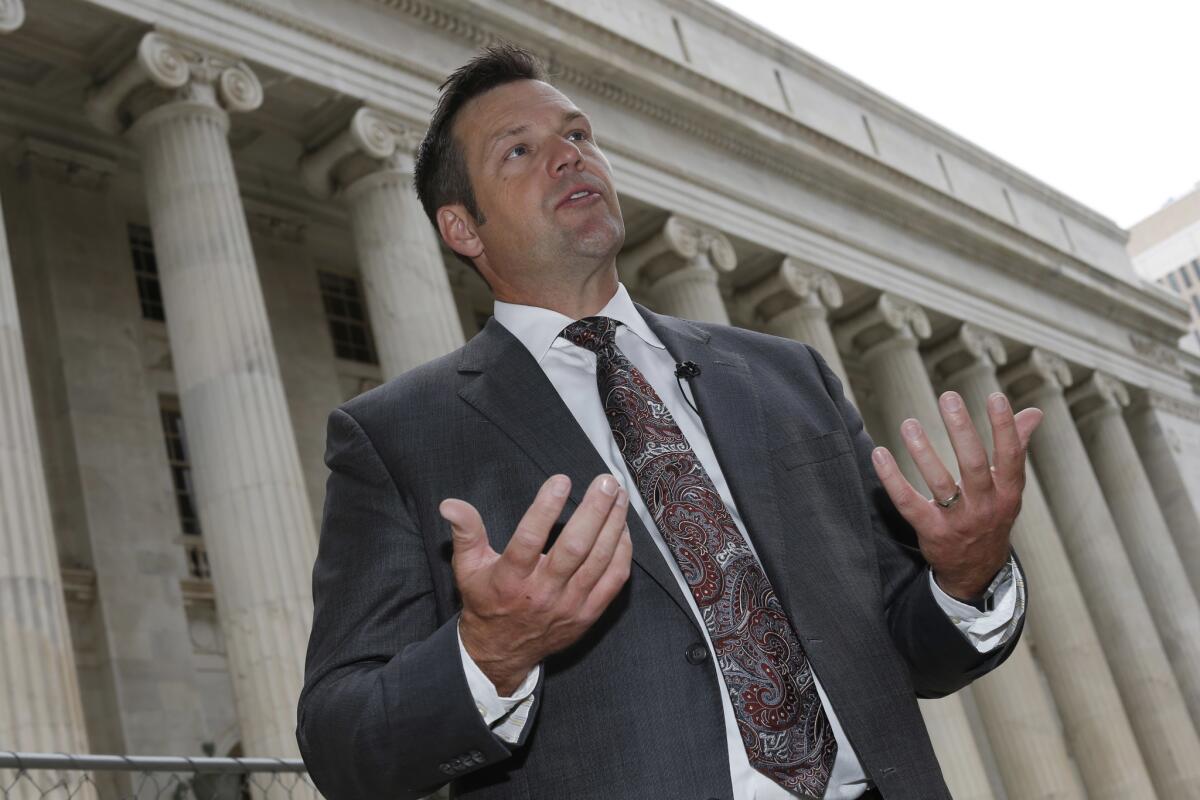Kansas official keeps fighting, sometimes uphill, for stringent immigration laws

Reporting from Topeka, Kan. — If there was any question whether the immigration debate is still raging in the heartland, it was probably settled the moment that Kansas Secretary of State Kris Kobach demanded the birth certificate of a 90-year-old World War II pilot.
On a stiflingly humid September day in central Kansas, Kobach pushed through the courtroom door, head bowed, a storm cloud on his face. His ever-present red tie, front-swept hair and 2-inch sideburns framed an even jawline. He is a secretary of state here, a man who has authored some of the most stringent immigration legislation in the country — often traveling the nation to argue his own cases — and has cleared a viable path to the governor’s mansion.
Behind a lectern facing the judge, an ACLU attorney finished her initial fusillade of oral arguments with a comment directed at Kobach.
“He has to use such convoluted reasoning,” said Sophia Lin Larkin, representing a class of voters who the ACLU argued was being treated as second-class citizens in Kobach’s voting system. “This is simply another variation of his mistaken understanding in this case.”
Kobach’s understanding of the voting-rights case is an extension of his philosophy on rights accorded to any American: They are conditional offers that only apply to those who can prove their citizenship.
Kobach then turned his attention to Melvin L. Brown, a plaintiff in the ACLU case, which accused Kobach of discriminating against voters who registered without showing proof of citizenship, part of a 2013 law he wrote.
A nonagenarian whose family first began to work the land in Kansas in 1850, Brown fought in World War II nearly a century later. When he registered to vote, he did not provide proof of his citizenship, making him one of 17,000 voters in Kansas who had been added to a “suspense list,” preventing them from voting in state and local elections until they could prove they are citizens.
Kobach said he was waiting to see anything from Brown and his wife, JoAnn, to establish that they even had standing to sue the state.
“We don’t actually have any evidence before the court. Do they have the birth certificates in their possession?” Kobach asked. “Just because he fought in a war doesn’t make him a citizen.”
In court, Kobach speaks in a rapid staccato, racing through the minutiae so quickly that a court reporter must ask him, twice, to stop and start over. When addressing the points he wants to emphasize, he has a professor’s manner of enunciating quotes and slow-rolling through the material that will probably be on the test.
He is also brash. At one point, Larkin objected to one of his questions. Such an objection usually stops a proceeding cold while the judge decides whether the objection has merit. Instead, Kobach turned to the witness and said, “You can answer.”

“You generally stop when there’s an objection so I can rule on it,” Hendricks said in an admonishment from the bench.
Kobach soared to national attention for his forceful presence in the courtroom, arguing with other attorneys under the sallow light of fluorescent bulbs, far from the colorful roar of political rallies where his legislation is embraced.
Kobach, 50, joined the U.S. Department of Justice under former Atty. Gen. John Ashcroft in 2001. Two years later, he returned to his position as a law professor at the University of Missouri-Kansas City when he began to write bills for other states.
An Arizona state senator came to him looking for wording on immigration legislation. Legislators in Alabama did the same. Mitt Romney adopted his policy of asking migrants in the country illegally to self-deport from Kobach, and Republican presidential nominee Donald Trump brings him to anti-immigration rallies in Texas and the Midwest.
On his desk is an onyx rectangle inscribed with gold lettering: “May the bridges I burn light the way.” When arguments in the outside world get tetchy, his wife, Heather, must sometimes remind him, “You’re not in court.”
Yet even as he battles full-steam in the courthouse, much of the legislation he wrote or inspired has been systematically declawed by the U.S. Department of Justice and the court, and polls show the nation has grown more accommodating of immigration and tolerant of those here illegally.
Kobach’s most controversial piece of legislation, Arizona’s SB 1070, suffered a resounding setback recently when Arizona’s attorney general settled with groups suing the state for $1.4 million in attorneys’ fees and a pledge to forbid all police officers from prolonging traffic stops to check for immigration status.
Immigration checks during traffic stops was the signature piece of legislation left over from the halcyon days of the strong-borders movement, when a host of states, both far and near the Mexican border, began proposing, and sometimes passing, stringent immigration laws, many of them written by Kobach.
And despite his swagger in the courtroom, Kobach has now announced a settlement in the ACLU case, a deal that will allow voters on the “suspense list” — including the World War II vet — to vote in the November election.
Still, some of Kobach’s handiwork remains intact, such as an ordinance in tiny Fremont, Neb., that bans renting to those in the country illegally. The U.S. Supreme Court declined to hear the case, and the ordinance was upheld.
Looking back at his intentions in 2010 and 2011, his first year in office, he said he is content with what has been accomplished, and believes he and others have forestalled a further loosening of immigration laws.
Kobach is not deterred by a changing nation, and in fact feels that a shift in direction is coming.
“People are coming to understand the rule of law,” Kobach said.
He is also convinced that simply fighting the pro-immigrant stance of the Obama administration to a draw is itself a victory, particularly initiatives to defer the deportation of early childhood arrivals to the U.S. and their parents. Kobach represented 10 Immigrations and Customs Enforcement agents who sued the Obama administration over the deferments.
A popular refrain shared by immigration opponents and advocates is that the immigration system itself is in collapse and must be overhauled to match the needs of a global economy. Kobach, though, is tired of hearing the same line.
“They say, ‘The system is broken, the system is broken,’ ” Kobach said. “The system is fine. The laws as written will work. But we have to enforce them.”
Kobach urges his critics not to confuse his zealotry for the rule of law with racism. The U.S. that he envisions is still a country that opens its arms to the world, he said.
“Give us your huddled masses yearning to breathe free. We simply ask that they come through a port of entry and follow our laws.”
Follow Nigel Duara on Twitter: @nigelduara
More to Read
Sign up for Essential California
The most important California stories and recommendations in your inbox every morning.
You may occasionally receive promotional content from the Los Angeles Times.











